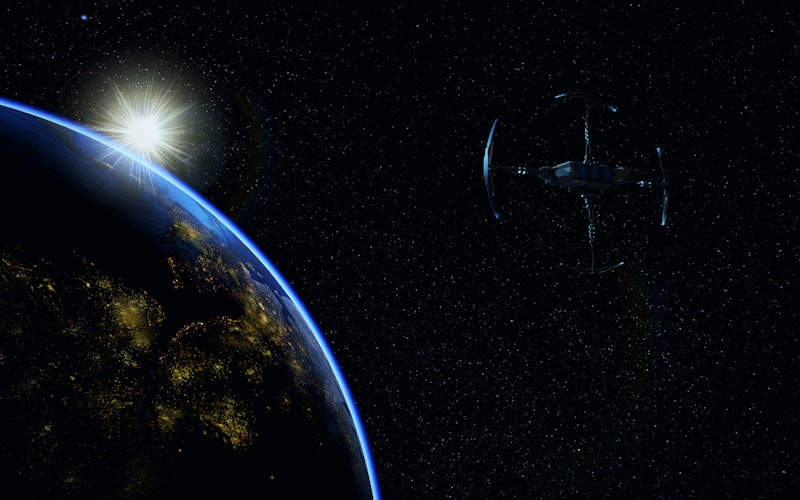
Games
Immigrants, Aliens, and The Station
We all know how dangerous aliens can be. Raining destruction on cities, performing horrific experiments on captive humans, and bursting malevolently out of an unfortunate host, these off-planet monsters are an endless source of horrified fascination for us in countless movies, novels, and video games. At the same time, we've also seen stories of more benevolent interactions: E.T., for example, or the visitors in the recent Arrival. Aliens seem to represent either a threat or a promise.
This tension lies at the heart of the new indie video game The Station. The narrative-heavy puzzle game puts us in the role of a representative of Axiom Corporation, which has a cloaked spaceship orbiting an alien planet, doing surveillance of a species that is engaged in some kind of civil war. The hidden space outpost has gone silent for several days now, so an Axiom rep has been sent in to determine what has gone wrong.
As a player explores the apparently lifeless ship, solving various technical puzzles in order to get things back in working order, you find recordings, diaries, promotional brochures, and messages that help us unravel what happened. It quickly becomes clear that the crew had been wrestling with the appropriate approach to the aliens. These beings are clearly less technologically advanced, but developed enough that they could be dangerous. Should the approach be open and friendly? Should it be more hostile? Should the surveillance ship stay hidden and, thus, decidedly neutral?
From the documentation left behind, we learn that each of the missing employees carries an agenda or emotional baggage. Aiden, the engineer, has a daughter with a genetic disorder; Mila, the captain, is trying to escape the shadow of her famous father; and Silas, the scientist, is focused almost exclusively on the potential of research to bring progress to the aliens. This last theme is particularly interesting: Silas wants to make contact out of hubris, assuming his advanced civilization can lift up this primitive, violent new species.
All good science fiction, in spite of its futuristic and frequently inhuman elements, is at least partly about who we are, how we act, and what we believe today. The Station is no exception in this regard. Dealing with aliens is a decidedly human activity, even if we never actually interact with extraterrestrials. In one sense human history is the long story of cultures having to deal with other cultures, of in-groups relating to out-groups, of estranged people deciding what they should do to and with each other. It is also a burning contemporary issue, as countries around the world deal with massive influxes of refugees, as well as the best way to handle potential immigrants.
All good science fiction is at least partly about who we are, how we act, and what we believe.
New faces can mean new ideas that can infuse new life into old and dead communities and practices. New friends, new workers, new creators can build webs of relationships that are richer than the ones they displace and modify. Yet outsiders also bring challenges. The clashing of cultures can result in violence, especially when one side of the divide makes contact as conquerors, seeking to remake the newcomers in their own image. At the very least, new people with new ways of doing things will be inconvenient—inevitably changing things and unsettling what has already been built.
So what does Scripture teach us about encountering the alien? There are certainly plenty of passages in the Old Testament that warn the Israelites about getting too close to the pagan cultures around them. The New Testament, especially Jude, warns about the dangers of compromising with the world outside the church. And yet, the general posture of the Bible is that God’s followers need to take risks of hospitality and openness.
In Jeremiah, the people of Yahweh are called to protect and care for outsiders, just as they are called to protect and care for the orphan and widow. In the New Testament, Jesus shows healing mercy to a Canaanite woman and a Roman centurion (one of his people’s oppressors). He also chats with a Samaritan woman. His Great Commission calls his followers to go everywhere and talk to everyone about the love of God. This is not a position of guarded neutrality, of keeping out the dangerous outsider. This is a gospel for everyone, even when sharing it is a risk.
The Station, especially with its remarkable conclusion, has enough narrative ambiguity that players can read it in a number of different ways. For me, the game is a reminder that when we are confronted with the possible threat of the outsider, God calls us to be humble and vulnerable in the pursuit of relationship. That’s how the Kingdom is built.
Topics: Games